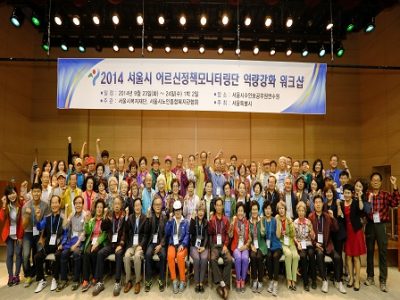Senior Policy Monitoring Groups



Seoul City began implementing the project to build an age-friendly city in 2010, and, in June 2013, Seoul became the first Korean city (and only the third in Asia) to become a member of the WHO Global Network of Age-friendly Cities and Communities (GNAFCC). In the course of the preparations for joining the membership of the GNAFCC, Seoul City placed considerable emphasis on the importance of senior citizens’ direct participation in policy decisions. Since 2012, Seoul City has been running Senior Policy Monitoring Groups on various themes for two to three months each year, providing seniors with the opportunity to share their views with city officials.The Senior Policy Monitoring Groups are planned and managed by the Seoul Welfare Foundation — which is a partner of the project to build Seoul City’s Age-Friendly City, under the control of Seoul City’s Senior Welfare Department — in cooperation with the Seoul Association of Senior Welfare Centers, to support the execution of the project since 2014.The monitoring groups are composed of around 50 people aged over 60 years chosen from across Seoul, who work as volunteers in honorary positions. However, some men in their fifties participated in the support for baby-boomers (born between 1955 and 1963), which was the first category (also described as ‘support for double-cropping in life’ in the action plan) of Seoul City’s action plan for becoming an age-friendly city. Seoul City has been striving to reflect the opinions of various social classes and age groups, including participants from low-income groups in 2013 and young people in 2014.The members of the monitoring group are responsible for discovering examples of Seoul City’s age-friendly policies and achievements from senior citizens’ point of view, and for promoting Seoul as an age-friendly city. To that end, the members carry out various group or individual investigation activities, and share and arrange their results by preparing a report or participating in a group interview. In the final stage of the activities, based on the results, the members develop an idea about an appropriate policy for senior citizens and propose it to Seoul City. Such a proposal is then delivered directly to the policy decision makers through an official presentation event on the achievements organized by Seoul City.
Website: http://afc.welfare.seoul.kr/afc/sub01/e-sub01.action
Main target group: Older people in general
Other target group(s): None
Sector(s): Social protection
Desired outcome for older people:
Learn, grow and make decisions
Other Issues: Social participation
Name: Jeong, Eunha
Email address: 93eunha@welfare.seoul.kr
Preferred language(s): English